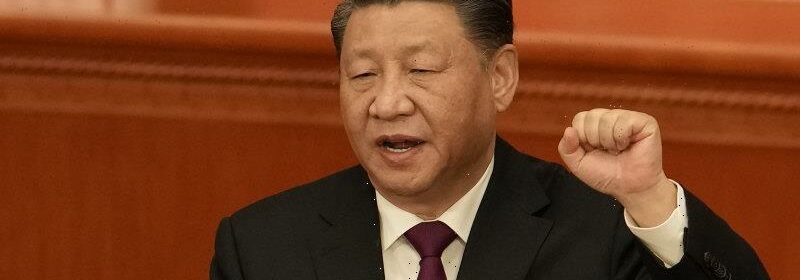Riled by AUKUS, Beijing builds military and diplomatic defences

Beijing is bolstering its diplomatic clout, protecting its economy and ramping up its defence forces as it confronts two multinational networks specifically designed to contain its growth, AUKUS and the Quad.
Australia – by intention and geographical circumstance – has found itself in the middle of both. It will now become the launchpad for US and UK-made nuclear submarines in the Asia Pacific through the $368 billion investment in AUKUS announced in San Diego on Tuesday.
China will respond. It has to if it is going to protect its self-interest.
Chinese President Xi Jinping. Credit:AP
The Chinese Mission to the United Nations said on Twitter the submarine deal was “a blatant act that constitutes serious nuclear proliferation risks, undermines the international non-proliferation system, fuels arms races, and hurts peace and stability in the region”.
“Such a huge investment would leave Australia with a heavy burden,” Chinese military expert Song Zhongping told Chinese state media on Tuesday. “It cannot protect the security of Australia but will protect the global hegemony of the US. It’s an expensive mistake.”
The clearest sign is not just in the language coming out of Beijing but in the escalation of its own military-building programs and diplomatic blitz of its economic partners.
China has an estimated 66 submarines, including 12 nuclear-powered vessels built over the past 15 years. The United States has more than 70. Australia will acquire eight under the AUKUS deal. Chinese President Xi Jinping does not believe that China’s broader military capability is enough. On Monday, he called for the military to become the country’s “great wall of steel”.
“Security is the foundation for development, stability is the prerequisite for prosperity,” he said at the closing of the National People’s Congress in Beijing.
“[We must] build the People’s Liberation Army into a great wall of steel that effectively safeguards national sovereignty, security, and development interests.”
Xi is preoccupied with the internal protection of his ideology, power and by extension the Chinese economy. His call for an escalation of military build-up is, at this stage, about the defence of all those interests, but as Beijing becomes more powerful that could shift quickly to offence, a scenario the AUKUS agreement aims to guard against.
“We have finally washed away the national humiliation, and Chinese people are the master of their own destiny,” Xi said. “The Chinese nation has stood up, become rich and is becoming strong.”
Xi is now framing the unification with neighbouring Taiwan by negotiation or force as a fait accompli.
“The great rejuvenation of the Chinese nation has entered an irreversible historical process,” he said.
If AUKUS is successful it will deter China from making an attack over the coming decades. If it fails, it could invite an attack from an emboldened Beijing that could have disastrous consequences.
Both scenarios are possible, which is why diplomacy will be critical to negotiating a peaceful solution.
China is putting itself in the strongest diplomatic position it can muster. It has done so by collecting developing countries and autocratic governments into its orbit.
While Prime Minister Anthony Albanese and British Prime Minister Rishi Sunak were on their way to San Diego, Chinese officials were negotiating a potential deal to reduce tension between Iran and Saudi Arabia. Top diplomat Wang Yi took a swipe at the US by saying Beijing would “not seek to fill the so-called vacuum or put up exclusive blocs”. Xi is set to visit Moscow next week.
Tellingly, AUKUS did not rate a mention on China’s national news service Xinhua on Tuesday. But one other meeting did.
Iranian President Ebrahim Raisi met with Belarusian President Alexander Lukashenko in Tehran. Raisi said he was ready to share his experience of dealing with sanctions with “friendly Belarus”, a country that has spent the past year supporting Russia’s invasion of Ukraine.
China is framing itself as the arbitrator of a new world order – free from sanctions, human rights condemnation, and economic retaliation. AUKUS, and the Western order it represents, could have a lot more to contend with than just submarines.
Get a note directly from our foreign correspondents on what’s making headlines around the world. Sign up for the weekly What in the World newsletter here.
Most Viewed in World
From our partners
Source: Read Full Article
